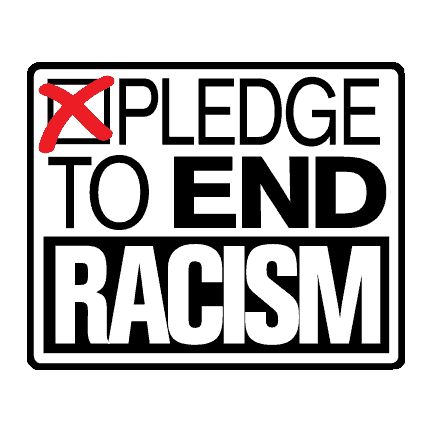This piece was written by Lynne Edwards, a signer of the Richmond Pledge to End Racism and a participant in our Living the Pledge workhop.
May 25, 2021
There are so many thoughts and feelings swirling in and around me. Right now I am thinking about George Floyd’s family. How are they grieving his loss as his image is circling the globe, as his death continues to be replayed? He was murdered over a pack of cigarettes. It is said that when the police took custody of him, before he ever hit the ground, he said “tell my children I love them. I’m going to die”. I hope the verdict was comforting, but it certainly did not justify his death. There was nothing fair or equitable about it. He was murdered while people stood by and watched, silently. How is his family coping? How does any family cope with a senseless murder committed by someone who is supposed to protect people and yet has the legal right to kill without immediate arrest and prosecution? How do they heal the emotional scars left behind? What do they say in their prayers? How are they honoring him? What do they say to his children when they ask why? How do they get out of bed, go outside, work, continue to love?
Mr. Floyd’s death seems to have been a wakeup call for many white people. Thousands across the country hit the streets chanting Black Lives Matter. Confederate monuments crashed to the ground. Outrage fueled the fires of injustice. Suddenly white people are reading books, taking classes on anti-racism, identifying themselves as racist without expecting absolution, challenging the systems their ancestors created. Ex-basketball pro and friend Stephen Jackson was seen holding Mr. Floyd’s daughter on his shoulders, with her arms outstretched saying “Daddy changed the world!” Is the world really changing?
I read the following text from the NYT daily briefing I receive. The article was talking about the expected decline in the world population, several generations forward: “A planet with fewer people could ease pressure on resources, slow climate change and reduce burdens for women. But the data also points to changes that are hard to fathom: Fewer workers could upend the ways societies are organized and our ideas about family and nation.” So what would be wrong with upending the way society is organized? Isn’t that what needs to happen? Shouldn’t we be changing our ideas about family and nation and humanness and democracy and what real justice looks like?
It’s a huge task when you try to think of changing society, changing social and political systems, changing attitudes. Are we up to it? Will we follow through? Will George Floyd’s daughter feel the change? Will his grandchildren, great-grandchildren? When?
I think I’m doing the best I can but is it enough? How do we honor George Floyd and the so many people who came before and after him? Maybe I need to think smaller. Maybe I don’t even need to think so much. Get out of my head and into my soul. So this is what I will do to honor him, his family, and other victims of racism, living and dead: I will embrace hope and positivity. I will get out of my comfort zone as often as possible. I will continue my journey to be an antiracist; I will call out racist actions and take responsibility for my own; I will support others in their journey. I will change what I can. But most of all I will continue to be in relationship with the people around me who embrace hope and positivity.
And I will lift up Black people, acknowledge their courage, resilience, their contributions to who I am and who I am becoming. I will admire their sense of family, their kinship networks, their intelligence, their pride, their kindness, their humor, their faith, their music, their beauty, their hospitality, their humor, their empathy, and I will respect the beautiful culture they have maintained and enhanced in the midst of the horror and fear that has surrounded them in this country they did not ask to be in. Maybe one day we white folks will be able to demonstrate what Black culture has demonstrated for more than 400 years, that human beings have the capacity to triumph over trauma. Let it be.
